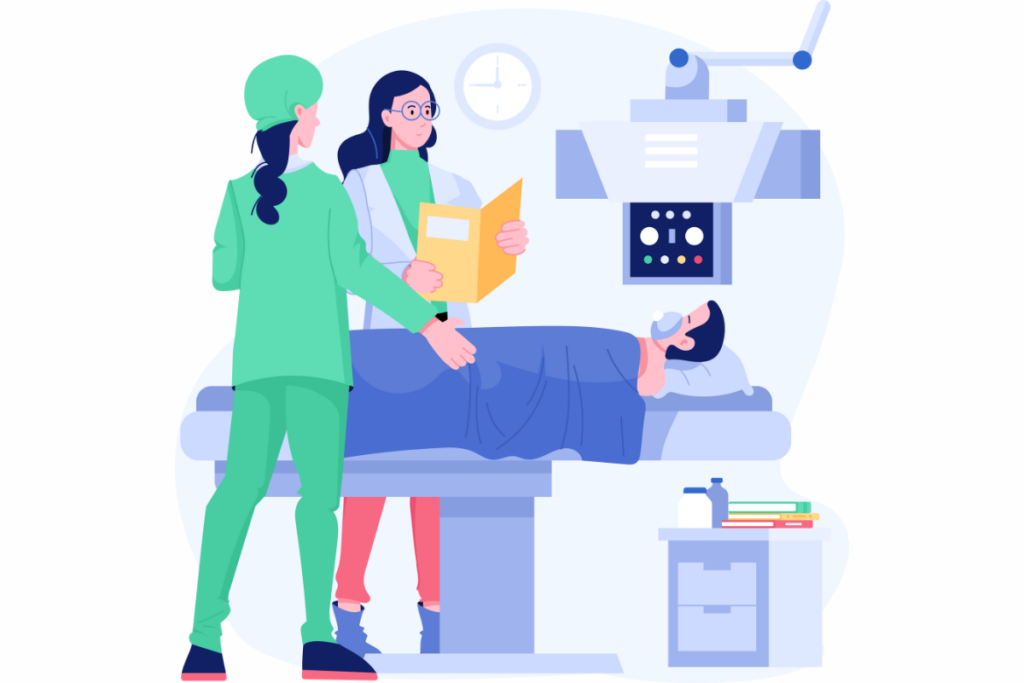チャンク毎の意味
「わからない部分があっても、そのまま英文を読み進めて大丈夫です。むしろその方が、「英語を英語のまま理解する力」が早く育つこともあります。
「それではまだほとんど意味がわからない」、「どうしても意味のわからない箇所が気になる」という場合は、英文をチャンク(小さな意味のかたまり)に区切って理解すると全体の意味がラクに掴めるようになります。
ただし、この時に「日本語の語順に直すことなく、英語の語順のままで意味を理解する」ようにしてください。これが英語をモノにする鍵となります。
なお、チャンク文や和訳は「必ず読むもの」ではありません。細かい分析がストレスになるようでしたら、無理に読まず、英文だけを楽しんでください。
つまり、英文以外を「読む」か「読まない」かは、あなたがより心地よく感じる方を自由に選べば良いのです。

❶
Endoscopic ultrasound (EUS) is a test that uses a thin, flexible tube with a camera and an ultrasound device.
→ 超音波内視鏡検査(EUS)は、カメラと超音波装置がついた細くて柔軟な管を使う検査です。
- Endoscopic ultrasound (EUS) = 超音波内視鏡検査
- is a test that uses ~ = ~を使う検査である(that は関係代名詞。test を修飾)
- thin, flexible tube with ~ = ~を備えた細くて柔軟な管(形容詞 thin, flexible は tube を修飾)
❷
It helps doctors closely examine the digestive tract and nearby organs.
→ それによって医師は、消化管やその周辺の臓器を詳しく調べることができます。
- It helps 人 動詞 = 人が~するのを助ける
- closely examine = 詳しく調べる(closely = 副詞「綿密に、注意深く」)
- digestive tract = 消化管(digestive = 消化の、tract = 管)
- nearby organs = 近くの臓器(nearby = 近くの、形容詞)
❸
During the procedure, they can use a fine needle to collect a small tissue sample from a nearby tumor.
→ 検査中に、細い針を使って近くの腫瘍から小さな組織サンプルを採取することができます。
- During the procedure = 検査の間に(procedure = 医療などの「処置・手順」)
- they can use ~ to … = ~を使って…することができる
- a fine needle = 細い針
- collect a small tissue sample = 小さな組織サンプルを採取する
- from a nearby tumor = 近くの腫瘍から(tumor = 腫瘍)
❹
This helps detect cancer cells and identify their type.
→ これによって、がん細胞の有無を見つけたり、その種類を特定したりできます。
- This helps 動詞 = これによって~できる(This = 前の文の行為を指す)
- detect cancer cells = がん細胞を検出する
- identify their type = その種類を特定する(identify = 見分ける、type = 種類)
❺
In my case, a tumor was suspected near the duodenum, so the sample obtained through the EUS was crucial in deciding my treatment plan.
→ 私の場合、十二指腸の近くに腫瘍が疑われたため、EUSで採取したサンプルが治療方針を決める上で非常に重要でした。
- In my case = 私の場合は
- a tumor was suspected = 腫瘍が疑われた(was suspected = 受け身)
- near the duodenum = 十二指腸の近くで(duodenum = 十二指腸)
- the sample obtained through the EUS = EUSによって採取されたサンプル(obtained は過去分詞、sample を修飾)
- was crucial in ~ = ~において極めて重要だった
- deciding my treatment plan = 治療方針を決めること(deciding = 動名詞)
❻
At my hospital, EUS is usually performed as an inpatient procedure, but this time it was scheduled as an outpatient exam, which made me very anxious.
→ 私の病院では、通常EUSは入院検査として行われますが、今回は外来検査として予定され、不安でたまりませんでした。
- At my hospital = 私の病院では
- EUS is usually performed = EUSは通常行われる(受け身の表現)
- as an inpatient procedure = 入院処置として(inpatient = 入院患者)
- this time it was scheduled as ~ = 今回は~として予定された(was scheduled = 受け身)
- an outpatient exam = 外来検査
- which made me very anxious = それが私をとても不安にさせた(関係代名詞 which の非制限用法)
❼
I asked my younger sister to come with me. She willingly agreed.
→ 妹に付き添ってほしいと頼むと、快く引き受けてくれました。
- I asked 人 to ~ = 人に~するよう頼んだ
- come with me = 一緒に来る
- She willingly agreed = 彼女は快く承諾した(willingly = 快く、自発的に)
❽
I’m the oldest of four siblings and have always tried to protect her. But this time, I turned to her for support.
→ 私は4人きょうだいの長女で、これまでずっと妹を守ろうとしてきました。でも今回は、私が彼女に頼りました。
- the oldest of four siblings = 4人きょうだいの中で一番上
- have always tried to ~ = いつも~しようとしてきた(現在完了)
- protect her = 彼女を守る
- I turned to her for support = 彼女に助けを求めた(turn to ~ for … = …を求めて~に頼る)
❾
Later, she said she was worried because I looked so weak – something she had never seen before.
→ 後になって、私がとても弱って見えたので心配だった、と妹が言いました。そんな姿は見たことがなかったそうです。
- she said (that) she was worried = 心配だったと彼女は言った
- because I looked so weak = 私がとても弱って見えたので
- something she had never seen before = それは彼女が今まで見たことのない姿だった(過去完了)
❿
I was barely conscious during the procedure because of the sedative.
→ 検査中は鎮静剤のせいで、ほとんど意識がありませんでした。
- was barely conscious = かろうじて意識がある(barely = ほとんど~ない)
- during the procedure = 検査中
- because of the sedative = 鎮静剤のせいで(sedative = 鎮静剤)
⓫
Near the end, I became more aware and wanted more sedation, but I couldn’t speak because of the tube in my mouth.
→ 終わりごろには少し意識が戻ってきて、もっと鎮静剤が欲しいと思いましたが、口にチューブがあって話せませんでした。
- Near the end = 終わりのほうで
- became more aware = 意識がはっきりしてきた(become aware = 気づく/意識が戻る)
- wanted more sedation = もっと鎮静剤がほしかった
- couldn’t speak = 話せなかった
- because of the tube in my mouth = 口にチューブが入っていたため
⓬
Being unable to say anything filled me with a sense of despair.
→ 何も言えないことが、私に深い絶望感をもたらしました。
- Being unable to ~ = ~できない状態であること(動名詞句)
- filled me with ~ = filled me with ~ = 私を~で満たした(原因となる出来事や状態が主語)
- a sense of despair = 絶望感(despair = 絶望)
⓭
I heard the supervising doctor say to the resident performing the endoscopy, “Good, that went well.”
→ 指導医が、内視鏡検査をしていた研修医に「うまくいったね」と言うのが聞こえました。
- heard 人 say ~ = 人が~と言うのを聞いた(知覚動詞 + 人 + 動詞原形)
- supervising doctor = 指導医
- resident performing the endoscopy = 内視鏡検査をしていた研修医
- “Good, that went well.” = 「うまくいったね」(会話の再現)
⓮
I realized that the resident had successfully obtained the tissue sample.
→ 私は、その研修医が無事に組織を採取できたのだとわかりました。
- realized that ~ = ~と気づいた
- had successfully obtained = 無事に取得していた(過去完了)
- the tissue sample = 組織サンプル
⓯
Finally, it was over.
→ そしてついに、検査が終わりました。
- Finally = ついに
- it was over = 終わった(it = 検査を指す)



コメント